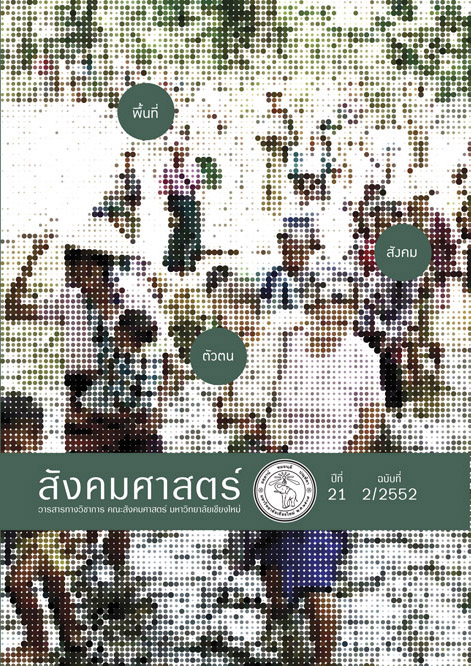Construction of Negotiating Spaces in Flexible Production of Women Workers in Cotton Hand-Weaving Industry
Main Article Content
Abstract
This article discusses the regulations which the cotton hand-weaving industrial system use to control female workers. The system tries to control female workers’ lived spaces in every dimension, consisting of houses, factories, community and female workers’ thoughts. However, female workers do not surrender to the system, but try to negotiate by diversifying the meaning of “worker”. Female workers’ self-definitions reflect the process by which they try to produce knowledge spaces that hybridise between their life experiences and situated knowledge at the present.
Article Details
All written articles published on Journal of Social Sciences is its author’s opinion which is not belonged to Faculty of Social Sciences, Chiang Mai University or is not in a responsibility of the journal’s editorial committee’s members.
References
วรวิทย์ เจริญเลิศ และ นภาพร อติวานิชยพงศ์. 2546. รายงานวิจัยเรื่องการพัฒนาระบบสวัสดิการสำหรับคนจนและคนด้อยโอกาส: กลุ่มแรงงานในภาคอุตสาหกรรม. กรุงเทพฯ: สำนักงานกองทุนสนับสนุนการวิจัย.
เสริมเกียรติ จอมจันทร์ยอง. 2542. การศึกษาปัญหาอุตสาหกรรมสิ่งทอขนาดย่อม อ.ป่าซาง จ.ลำพูน. เชียงใหม่: ภาควิชาวิศวกรรมอุตสาหการ คณะวิศวกรรมศาสตร์ มหาวิทยาลัยเชียงใหม่.
Kapadia, Karin. 2000. “Responsibility without Rights: Women workers in Bonded Labour in Rural Industry in South India”, in Derobah Bryceson, Cristobal Kay and Jos Mooij (eds.) Disappearing Peasantries?: Rural Labour in Africa, Asia and Latin America (pp. 247-261), London: ITDG Publishing.
Mill, Mary Beth. 2001. Thai Women in the Global Labor Force: Consuming Desires, Contested Selves. New Brunswick, New Jersey and London: Rutgers University Press.
Wright, Sarah. 2005. “Knowing Scale: Intellectual Property Rights, Knowledge Spaces and the Production of the Global”, Social & Cultural Geography 6(6): 903-921.


